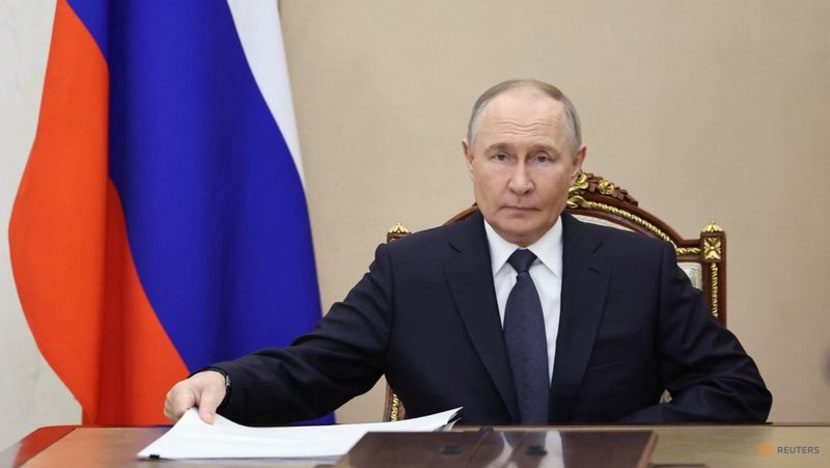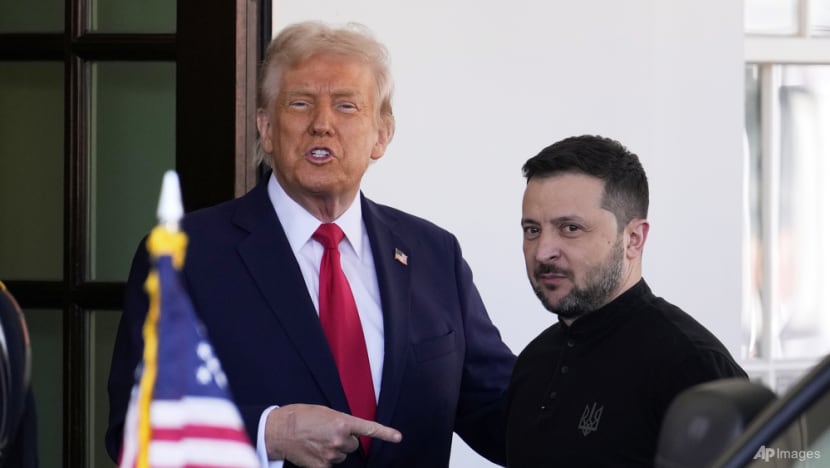Putin’s absence from Russia-Ukraine talks shows lack of intent to achieve peace: Analysts
Russian President Vladimir Putin will not attend direct peace talks to be held this week, despite Ukrainian President Volodymyr Zelenskyy's challenge for him to do so.

Russia's President Vladimir Putin chairs a meeting with senior officials to discuss the upcoming peace talks with Ukraine in Moscow, Russia May 14, 2025. Sputnik/Alexander Kazakov/Pool via REUTERS

This audio is generated by an AI tool.
Russian President Vladimir Putin will not be attending peace talks in Istanbul on the war in Ukraine on Thursday (May 15), despite calls from his Ukrainian counterpart Volodymyr Zelenskyy for him to show up.
Russia’s delegation will now be headed by presidential aide Vladimir Medinsky, in what is set to be the first direct peace negotiations between the warring nations since March 2022 – shortly after Moscow invaded its neighbour.
After the Kremlin confirmed Putin would not be attending, a United States official said that US President Donald Trump will also be skipping the talks.
“STALLING TACTIC”
Some observers said Putin’s absence shows a lack of intent to attain peace.
“It was something similar to the movie Guess Who’s Coming to Dinner? It was possibly going to be President Putin. It could also have been Trump,” said Aurel Braun, professor of international relations and political science at the University of Toronto.
“Now, we see that this is more or less a kind of stalling tactic. That is not surprising.”
Braun said Putin “appears to operate on that basis that he better stall because he is not ready to reach an agreement”.
This would necessitate Putin telling the Russian public that nothing much was gained from a great loss of lives and investment in the war, the analyst told CNA938.
“Circumstantial evidence suggests that somehow, Putin – with Trump coming back to the Oval Office a second time – seems to believe that time is on Russia's side. This is hard to understand,” Braun added.
“Russia has suffered huge losses. It is in deep economic difficulties. Europe is rearming, so Putin may be mistaken in that belief.”
The make-up of Russia’s delegation also indicates the lack of importance Moscow places on the meeting, said political analyst Lincoln Mitchell.
He pointed out that Putin did not send, for example, Russia’s Minister of Foreign Affairs Sergey Lavrov or someone of that level.
Still, he said Zelenskyy “has his hands tied” and “cannot be seen as the one who walks away”.
“We’ve seen the US waver on this from … humiliating Zelenskyy in the White House, to kind of warming up to him. Now, they want things from him. He (also) wants things from the US,” added Mitchell, who is an international and public affairs lecturer at Columbia University.
“He has to signal that he's serious about negotiating, even though Putin is signalling that he's not serious about negotiating.”
Zelenskyy earlier said Putin's absence would signal Moscow is not serious about achieving peace.
ZELENSKYY “CALLED PUTIN’S BLUFF”
Putin had on Sunday proposed direct talks between Russia and Ukraine “without any preconditions”.
This followed calls from Western powers for a 30-day ceasefire, after European leaders met in Kyiv on Saturday. Trump then pressed Moscow to accept the proposal.
Braun said Zelenskyy “called Putin’s bluff” in saying he would travel to Istanbul for face-to-face talks if Putin did so too.
“It’s obvious this is not what Putin is willing to do. We see that in all the Western capitals in Europe, there's a deep disappointment,” added Braun, who is also a research associate of the Davis Center for Russian and Eurasian Studies at Harvard University.
“The only one who seems to hold out some kind of hope that this is more than a bluff or a delay tactic (is) Trump.”

Mitchell said that if Putin negotiates directly with Zelenskyy, it suggests they are equals - something the Russian leader cannot agree to.
“That's why he started this war, because he does not consider Ukraine a state. So then, to meet one-on-one with their president would be a recognition of that,” he told CNA’s Asia First.
On the other hand, Graeme Gill, professor emeritus of government and international relations at the University of Sydney, said it would be “very unusual” for a head of state to attend such talks at an early stage.
Putin could make an appearance if significant progress is made early in the talks, he added, but this is “unlikely”.
“I think that the lower-level officials are the ones who will work towards a peace settlement, and we'll just see whether both sides are actually realistically committed to that sort of an outcome,” Gill told CNA’s Asia Now.
WHAT TO EXPECT FROM THE TALKS
In terms of what could be achieved at the talks, Mitchell said he does not expect an immediate resolution given that Kyiv and Moscow “are pretty far apart”.
“The dialogue is important … but there's no real common ground here that would lead to a fast conclusion of the war, unfortunately. Anything is possible, but there's some distance to cover here,” he added.
Gill said that while Kyiv’s and Moscow’s positions on issues like territory are currently “irreconcilable”, it is unclear what the “basic red-line issues” are and what either side is willing to compromise on.
He noted there is “room for some agreement” on the issue of Ukraine’s desire to join the North Atlantic Treaty Organization (NATO) military alliance. Kyiv has said it will be willing to forgo membership in exchange for a security guarantee.
Moscow has said it does not want Ukraine to join NATO, but acknowledged all countries in the region should have security guarantees.
“The issue again is that Russia has the whip hand in terms of the battlefield situation, and therefore that puts it in a much stronger position in the negotiations than Ukraine is,” Gill said.
He added that reaching a settlement is more in Kyiv’s interests rather than Russia’s.
“If there's no settlement, presumably, what's going to happen is that the war will continue its existing trajectory, and that is that the Russians will continue to gain ground in Ukraine,” he said.
















